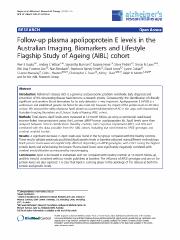Please use this identifier to cite or link to this item:
https://ahro.austin.org.au/austinjspui/handle/1/12728| Title: | Follow-up plasma apolipoprotein E levels in the Australian Imaging, Biomarkers and Lifestyle Flagship Study of Ageing (AIBL) cohort. | Austin Authors: | Gupta, Veer B;Wilson, Andrea C;Burnham, Samantha;Hone, Eugene;Pedrini, Steve;Laws, Simon M;Lim, Wei Ling Florence;Rembach, Alan;Rainey-Smith, Stephanie R;Ames, David;Cobiac, Lynne;Macaulay, S Lance;Masters, Colin L ;Rowe, Christopher C ;Bush, Ashley I;Martins, Ralph N | Institutional Author: | AIBL Research Group | Affiliation: | Florey Institute of Neuroscience and Mental Health, Parkville, VIC 3052 Australia Department of Nuclear Medicine & Centre for PET, Austin Health, Heidelberg, VIC 3084 Australia Centre of Excellence in Alzheimer's Disease Research and Care, School of Medical Sciences, Edith Cowan University, 270 Joondalup Drive, Joondalup, 6027 Australia ; McCusker Alzheimer's Research Foundation, Hollywood Medical Centre, 85 Monash Avenue, Suite 22, Nedlands, 6009 Australia ; Cooperative Research Centre for Mental Health, Carlton, VIC 3053 Australia ; School of Psychiatry and Clinical Neurosciences, The University of Western Australia, Nedlands, 6009 Australia Centre of Excellence in Alzheimer's Disease Research and Care, School of Medical Sciences, Edith Cowan University, 270 Joondalup Drive, Joondalup, 6027 Australia ; McCusker Alzheimer's Research Foundation, Hollywood Medical Centre, 85 Monash Avenue, Suite 22, Nedlands, 6009 Australia CSIRO Computational Informatics, Preventative Health Flagship, 65 Brockway Road, Floreat, 6014 Australia Centre of Excellence in Alzheimer's Disease Research and Care, School of Medical Sciences, Edith Cowan University, 270 Joondalup Drive, Joondalup, 6027 Australia ; McCusker Alzheimer's Research Foundation, Hollywood Medical Centre, 85 Monash Avenue, Suite 22, Nedlands, 6009 Australia ; Cooperative Research Centre for Mental Health, Carlton, VIC 3053 Australia Academic Unit for Psychiatry of Old Age, Department of Psychiatry, The University of Melbourne, St Vincent's Aged Psychiatry Service, St George's Hospital, Melbourne, VIC 3065 Australia ; National Ageing Research Institute, Parkville, VIC 3052 Australia CSIRO Preventative Health Flagship, Adelaide, SA 5000 Australia CSIRO, Parkville, VIC 3052 Australia Cooperative Research Centre for Mental Health, Carlton, VIC 3053 Australia ; Mental Health Research Institute, The University of Melbourne, Parkville, VIC 3052 Australia ; Centre for Neuroscience, The University of Melbourne, Parkville, VIC 3010 Australia |
Issue Date: | 20-Feb-2015 | Publication information: | Alzheimer's Research & Therapy 2015; 7(1): 16 | Abstract: | Alzheimer's disease (AD) is a growing socioeconomic problem worldwide. Early diagnosis and prevention of this devastating disease have become a research priority. Consequently, the identification of clinically significant and sensitive blood biomarkers for its early detection is very important. Apolipoprotein E (APOE) is a well-known and established genetic risk factor for late-onset AD; however, the impact of the protein level on AD risk is unclear. We assessed the utility of plasma ApoE protein as a potential biomarker of AD in the large, well-characterised Australian Imaging, Biomarkers and Lifestyle Study of Ageing (AIBL) cohort.Total plasma ApoE levels were measured at 18-month follow-up using a commercial bead-based enzyme-linked immunosorbent assay: the Luminex xMAP human apolipoprotein kit. ApoE levels were then analysed between clinical classifications (healthy controls, mild cognitive impairment (MCI) and AD) and correlated with the data available from the AIBL cohort, including but not limited to APOE genotype and cerebral amyloid burden.A significant decrease in ApoE levels was found in the AD group compared with the healthy controls. These results validate previously published ApoE protein levels at baseline obtained using different methodology. ApoE protein levels were also significantly affected, depending on APOE genotypes, with ε2/ε2 having the highest protein levels and ε4/ε4 having the lowest. Plasma ApoE levels were significantly negatively correlated with cerebral amyloid burden as measured by neuroimaging.ApoE is decreased in individuals with AD compared with healthy controls at 18-month follow-up, and this trend is consistent with our results published at baseline. The influence of APOE genotype and sex on the protein levels are also explored. It is clear that ApoE is a strong player in the aetiology of this disease at both the protein and genetic levels. | Gov't Doc #: | 25859282 | URI: | https://ahro.austin.org.au/austinjspui/handle/1/12728 | DOI: | 10.1186/s13195-015-0105-6 | Journal: | Alzheimer's research & therapy | URL: | https://pubmed.ncbi.nlm.nih.gov/25859282 | Type: | Journal Article |
| Appears in Collections: | Journal articles |
Files in This Item:
| File | Description | Size | Format | |
|---|---|---|---|---|
| 25859282.pdf | 794.52 kB | Adobe PDF |  View/Open |
Page view(s)
46
checked on Jan 1, 2025
Download(s)
118
checked on Jan 1, 2025
Google ScholarTM
Check
Items in AHRO are protected by copyright, with all rights reserved, unless otherwise indicated.
